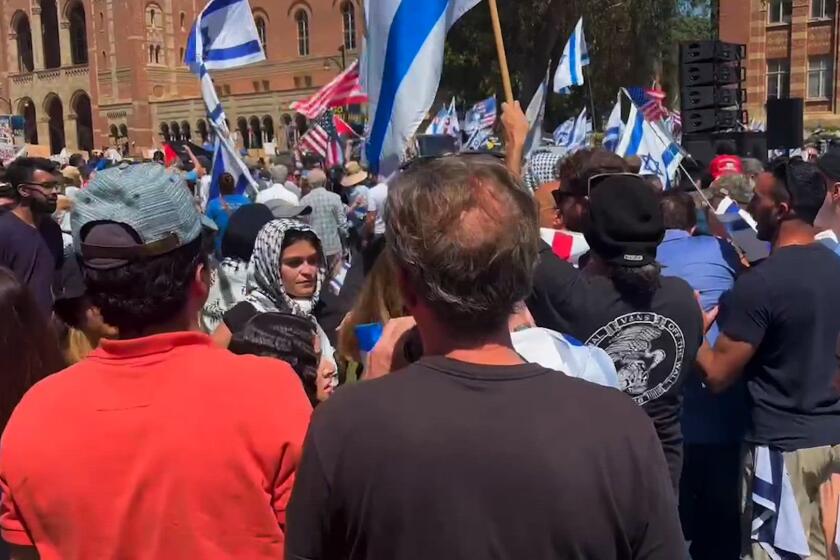
- Share via
UCLA was reeling Wednesday after hours of violence that unfolded overnight at a pro-Palestinian encampment, heightening concerns about the university’s handling of the protests over the Gaza war and the future of the camp.
Just before midnight, a large group, wearing black outfits and white masks, arrived on campus and tried to tear down the barricades surrounding the encampment.
Campers, some holding lumber and wearing goggles and helmets, rallied to defend the site’s perimeter.
Over several hours, counterdemonstrators hurled objects, including wood and a metal barrier, at the camp and those inside. Fights repeatedly broke out. Some tried to force their way into the camp, and the pro-Palestinian side used pepper spray to defend themselves. Fireworks were also launched into the camp.
The attack went uncountered for three hours, until dozens of officers from the California Highway Patrol, LAPD and other agencies arrived and restored order. The slow response sparked criticism and calls for investigations.
In a letter to the University of California Board of Regents obtained by The Times, UC President Michael V. Drake wrote that there is “sufficient confusion” surrounding the violence that he was ordering an independent review of the university’s planning, its actions and the response by law enforcement.
UCLA Chancellor Gene Block called the incident “a dark chapter in our campus’s history” and said the university was “carefully examining our own security processes in light of recent events.”
The question looming over the campus now is the fate of the camp. On Tuesday evening, UCLA had declared the camp “unlawful” and in violation of university policy.
In his letter to the regents, Drake said Block told him the university will dismantle the encampment — which was erected last week in a demand for divestment from Israel and an end to the country’s military actions in the Gaza Strip — at “the appropriate time.”
It is unclear how many people were injured in the incident. Drake wrote in the letter to the regents that 15 people were hurt. However, demonstrators said 25 members of their group were taken to hospitals for treatment. A 26-year-old man suffering from a head injury was taken to the hospital by paramedics, according to the Los Angeles Fire Department.
As the violence unfolded, students were tending to one another, treating eye irritation and other injuries inside the camp.
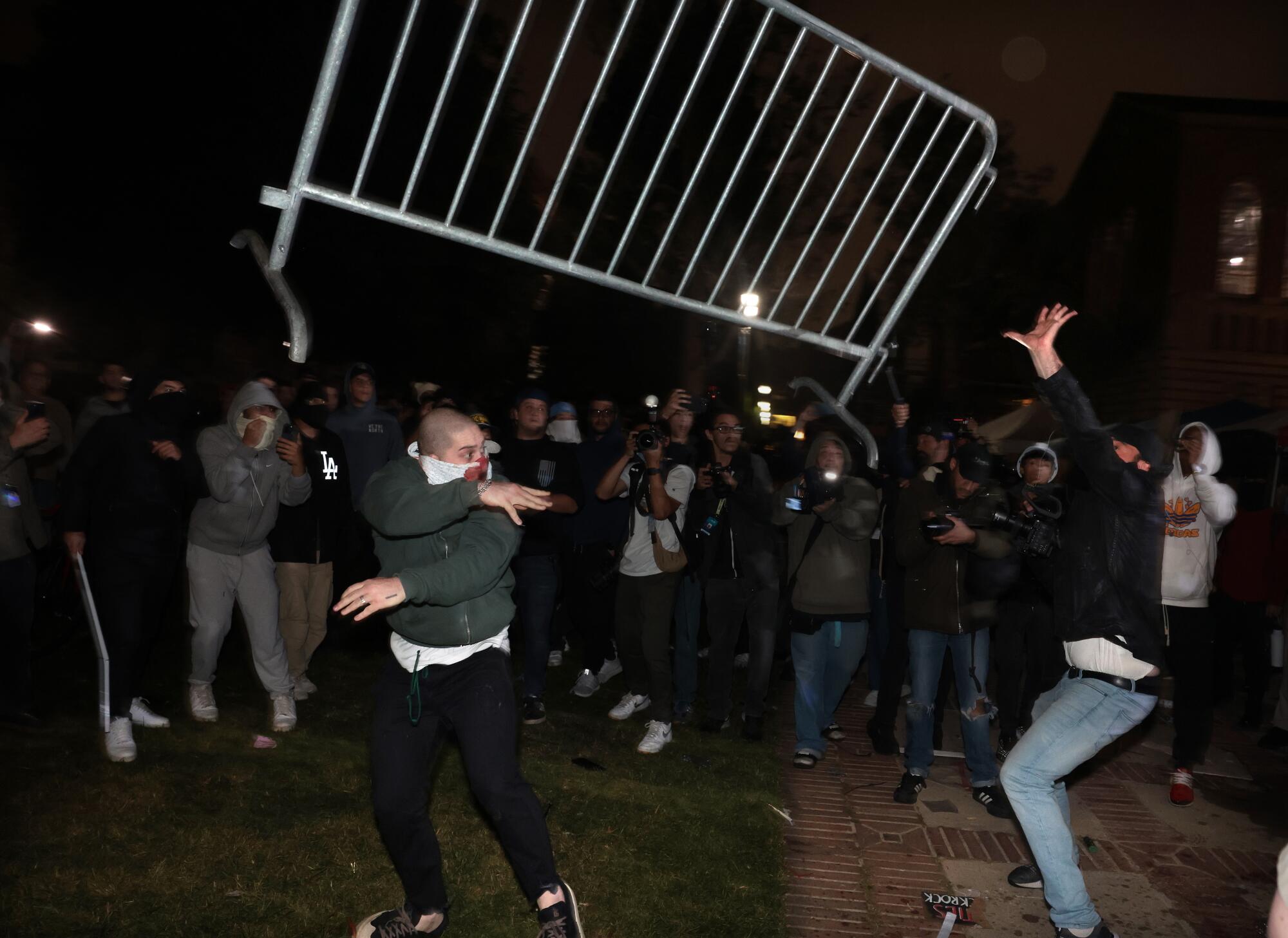
UCLA officials decried the violence and said they had requested help from the Los Angeles Police Department. It is unclear whether police made any arrests. UCLA police did not respond to a request for comment, and a spokesperson for the LAPD declined to comment Wednesday.
“Horrific acts of violence occurred at the encampment tonight, and we immediately called law enforcement for mutual aid support,” Mary Osako, vice chancellor for UCLA strategic communications, said in a statement. “The fire department and medical personnel are on the scene. We are sickened by this senseless violence and it must end.”
There were only a handful of university police on campus when the violence broke out. A group of private unarmed security guards observed the clashes but did not move in.
As pro-Palestinian protests grow at California colleges and universities, counterprotesters spark clashes at UCLA.
Around 1:40 a.m., police officers in riot gear arrived, and some counterprotesters began to leave. But the police did not immediately break up the clashes at the camp, which continued despite the law enforcement presence.
“There must be a full investigation into what occurred on campus last night,” L.A. Mayor Karen Bass said Wednesday. “Those involved in launching fireworks at other people, spraying chemicals and physically assaulting others will be found, arrested and prosecuted, as well as anyone involved in any form of violence or lawlessness.”
A camp representative said the counterdemonstrators repeatedly pushed over barricades that mark the boundaries of the encampment, and some campers said they were hit by a substance they thought was pepper spray. As counterprotesters attempted to pull down the wood boards surrounding the encampment, at least one person could be heard yelling, “Second nakba!” referring to the mass displacement and dispossession of Palestinians during the 1948 Arab-Israeli War.
Daily Bruin News Editor Catherine Hamilton said she was sprayed with some type of irritant and repeatedly punched in the chest and upper abdomen as she was reporting on the unrest. Another student journalist was pushed to the ground by counterprotesters and was beaten and kicked for nearly a minute, she said. Hamilton was treated at a hospital and released.
“I truly did not expect to be directly assaulted. I know that these individuals — at least the individual who initiated the mobilization against us — knew that we were journalists,” she said. “And while I did not think that protected us from harassment, I thought that might have [prevented us from being] assaulted. I was mistaken.”
Around 3 a.m., a line of officers arrived at the camp and pushed the remaining counterprotesters out of the quad area. The police told people to leave or face arrest.
1
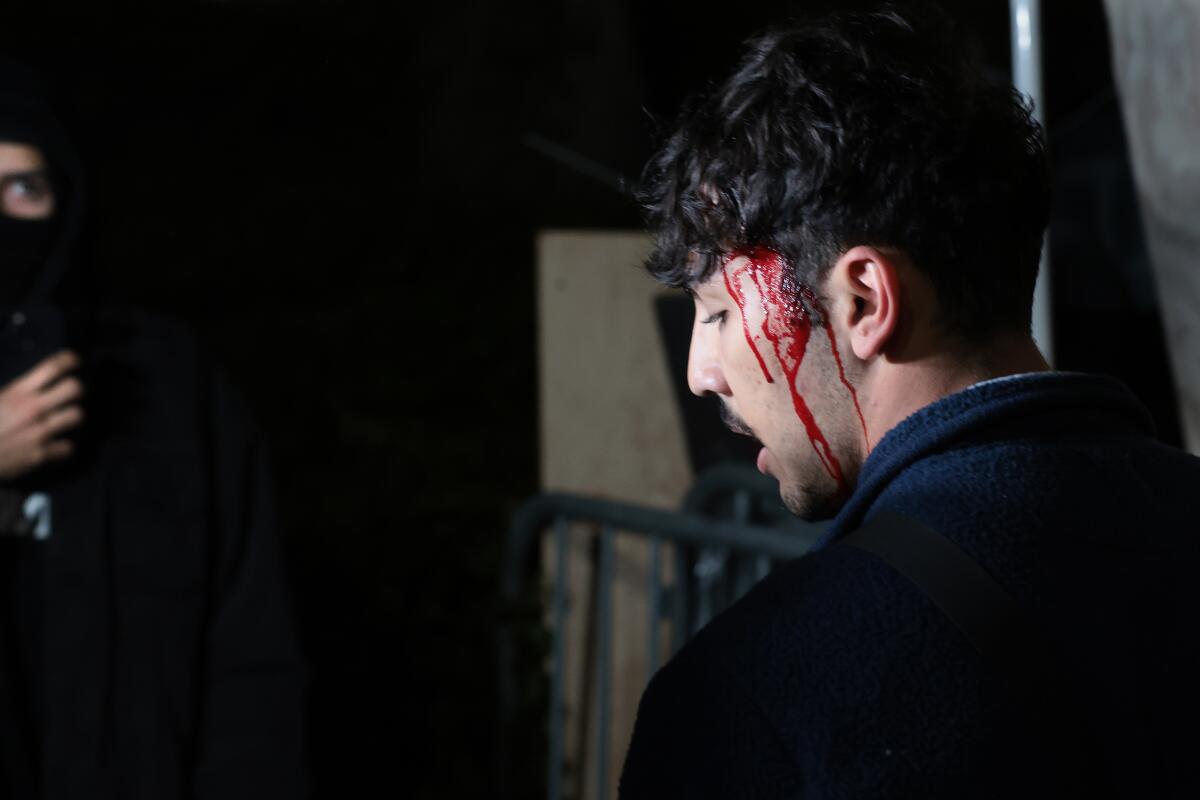
2
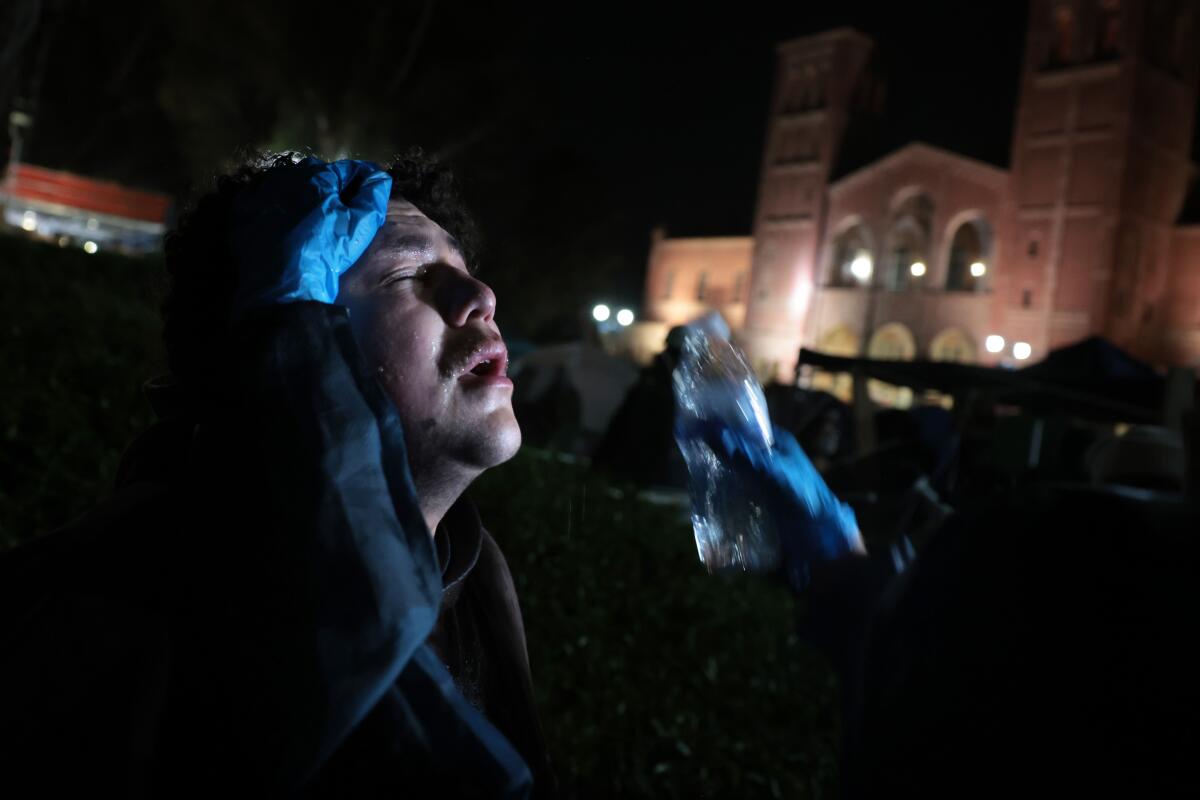
3
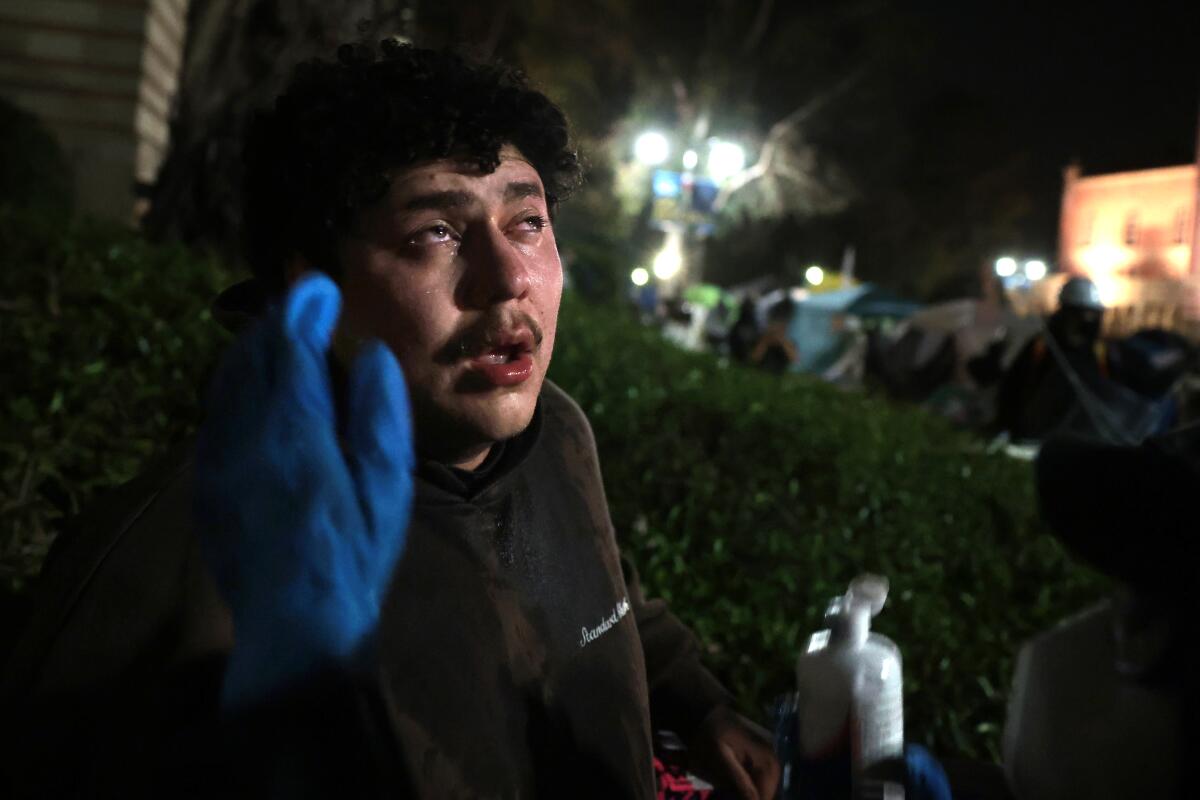
1. A pro-Palestinian protester bleeds from his head after clashing with pro-Israeli supporters at UCLA early Wednesday. 2. A pro-Palestinian protester gets his eyes washed after getting maced by pro-Israeli supporters at UCLA. 3. A pro-Palestinian protester tries to recover after being sprayed with mace. (Wally Skalij / Los Angeles)
Ananya Roy, a professor of urban planning, social welfare and geography, echoed concerns about the university’s lack of response when faced with a violent counterprotest.
“It gives people impunity to come to our campus as a rampaging mob,” she said. “The word is out they can do this repeatedly and get away with it. I am ashamed of my university.”
Hours after the violent episode, students on campus were still shaken. Campus security and the CHP were working to fortify all entrances into the encampment area.
Hannah Appel, assistant professor of anthropology at UCLA, stood at a staircase adjacent to Royce Hall where she allowed people bringing medical supplies, clothing and water into the encampment area.
“Because of the escalated violence last night, we have to be very vigilant and careful about who can come in and out,” Appel said behind a makeshift barricade.
Assemblymember Rick Chavez Zbur (D-Los Angeles), whose district includes the UCLA campus, criticized university administration in a statement Wednesday, saying they had failed to protect their students.
“No matter how strongly one may disagree with or be offended by the anti-Israel demonstrators’ messages, tactics, or goals, violence is never acceptable and those responsible must be held accountable,” Zbur said.
The Los Angeles chapter of the Council on American-Islamic Relations, a Muslim civil rights and advocacy organization, condemned the violence, which it said was carried out by a “mob of pro-Israel extremists.” CAIR-LA Executive Director Hussam Ayloush called on law enforcement to identify and hold accountable those who participated and for Atty. Gen. Rob Bonta to investigate the police response.
Photos: Clashes erupt at pro-Palestinian demonstrations on California campuses
“Last night’s attack on UCLA students supporting Palestine was only the latest incident of violence against them. In recent days, pro-Israel extremists directed racial slurs and sexual threats at students, spat on a student and released a pack of mice into the encampment,” Ayloush said in a statement.
The nonprofit organization Jewish Federation Los Angeles said in a statement Wednesday morning that it was “appalled” by the violence on campus overnight and placed blame on campus leaders. The group also called for the chancellor to remove the encampment.
“The abhorrent actions of a few counterprotesters last night do not represent the Jewish community or our values,” the group wrote. “We believe in peaceful, civic discourse.”
UCLA is one of numerous universities where students have erected tents as part of a wave of protests by students, faculty members and staffers demanding an end to Israel’s actions in the Gaza Strip and divestment from firms that sell weapons or services to the country.
Photos: Clashes erupt at pro-Palestinian demonstrations on California campuses
The Westwood campus became the first in the University of California system to move against an encampment. Others have been set up at UC campuses at Berkeley, Riverside and Irvine along with colleges and universities across the nation.
UC has generally taken a lighter touch in handling protests than USC, Columbia and other campuses that have called in police, who have arrested hundreds of students.
The violence came on the same day that the U.S. House committee investigating antisemitism announced Block would testify about his campus actions to stop bias and harassment against Jewish students. The May 23 hearing is also set to include the presidents of Yale and the University of Michigan. The hearings have derailed the careers of the presidents of the University of Pennsylvania and Harvard. Block has already announced he is stepping down as chancellor on July 31.
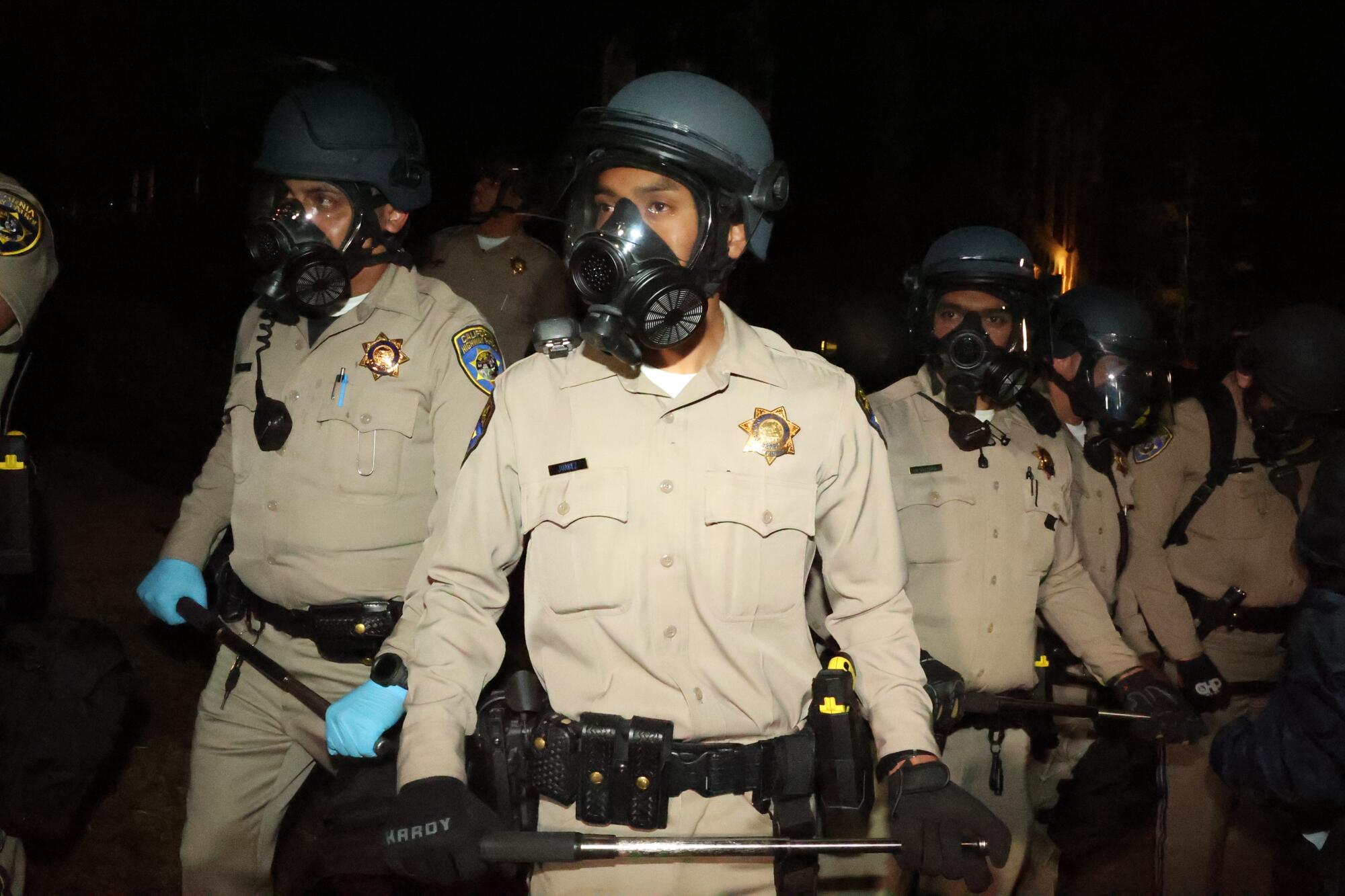
In a statement Tuesday, Drake, the UC president, said he “fully” supported UCLA’s action. UC must be “as flexible as it can” in matters of free speech, he said, but must act in cases where student learning and expression are blocked, university functions disrupted and safety threatened.
“The University of California campuses will work with students, faculty and staff to make space available and do all we can to protect these protests and demonstrations,” he said. “But disruptive unlawful protests that violate the rights of our fellow citizens are unacceptable and cannot be tolerated.”
He did not specify what behavior at UCLA he found unacceptable.
The UC Board of Regents has scheduled a closed-door meeting Friday to discuss the student protests.
Pro-Israel and pro-Palestinian demonstrators clash Sunday at UCLA, one day after protests erupted again at USC, where 93 people were arrested last week.
UC guidance — developed after widespread furor involving a 2011 incident at UC Davis, when police pepper-sprayed students who were peacefully protesting social and economic inequality during the Occupy movement — has led colleges to use a flexible approach in allowing protests as long as they are peaceful and don’t impede campus operations, learning or teaching. Police action should be a last resort, the guidance says.
But Block said Tuesday that although many demonstrators have been peaceful, others have used tactics that have “frankly been shocking and shameful.”
“We have seen instances of violence completely at odds with our values as an institution dedicated to respect and mutual understanding,” he said in a message to the campus community. “In other cases, students on their way to class have been physically blocked from accessing parts of the campus.
Nearly 100 people, including students, were arrested at a peaceful protest at USC. Other college campuses across California have seen an increase in protests related to the Israel-Hamas war.
“UCLA supports peaceful protest, but not activism that harms our ability to carry out our academic mission and makes people in our community feel bullied, threatened and afraid,” he wrote. He added that the incidents had put many on campus, “especially our Jewish students,” in a state of anxiety and fear.
High levels of fear also have been reported by pro-Palestinian students, which Block did not mention — an omission that outraged some campus members.
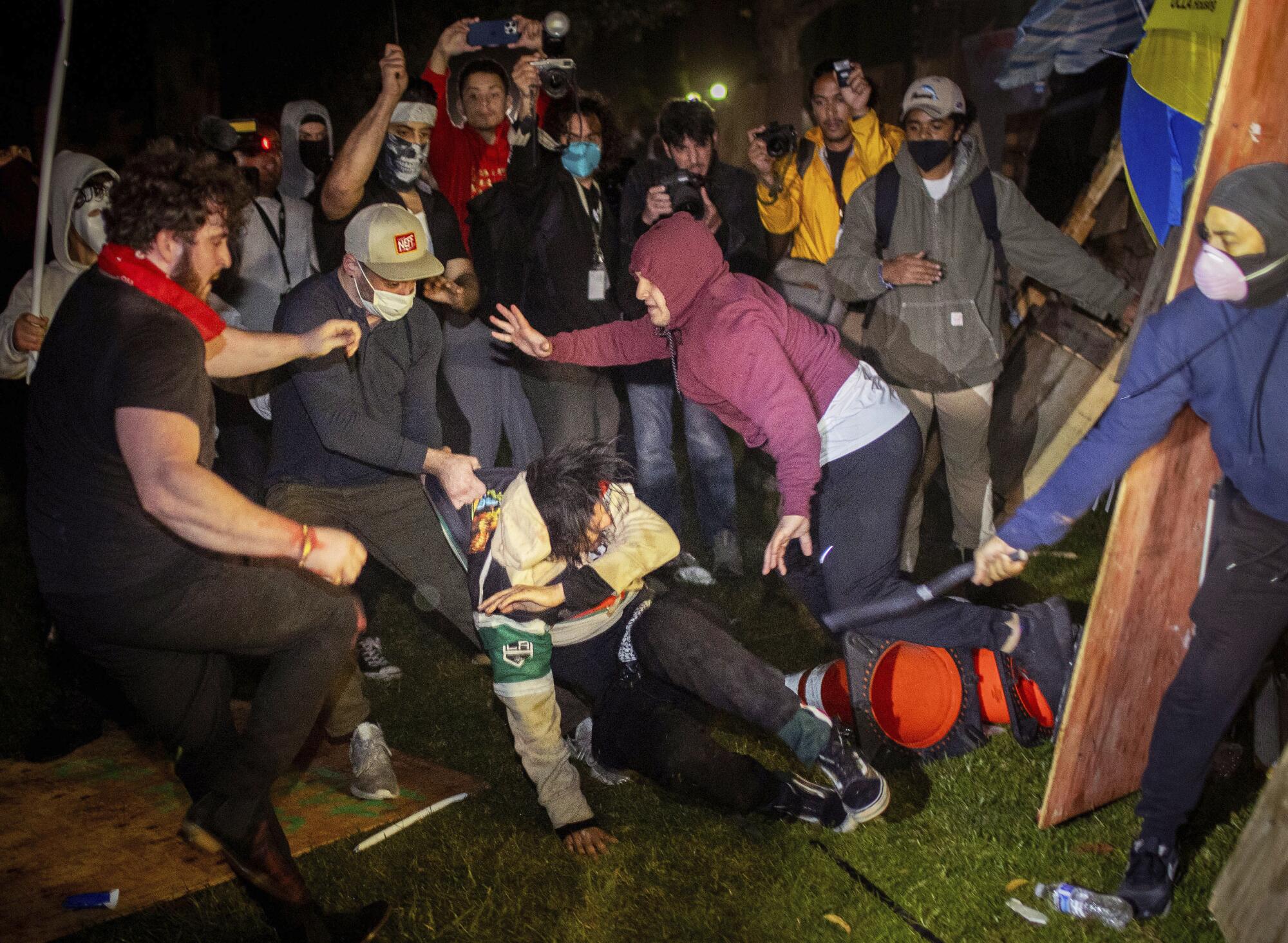
“It is quite shocking and demoralizing that the chancellor notes only the antisemitism faced by Jewish students when in fact there has been a significant number of incidents of racism and violence against Palestinians, Muslims and, in fact, anyone considered a supporter of Palestinian rights,” said Sherene Razack, a professor of gender studies.
The “Palestinian Solidarity Encampment” said in a statement that “Zionist aggressors,” most of them not UCLA students, had been “incessantly verbally and physically harassing us, violently trying to storm the camp, and threatening us with weapons.” But campus security did nothing to protect them, the statement said.
The group decried UCLA’s move to end the encampment as a “cowardly intimidation tactic” and a “continuation of a long history of attempts to shut down student activism and silence pro-Palestinian voices.”
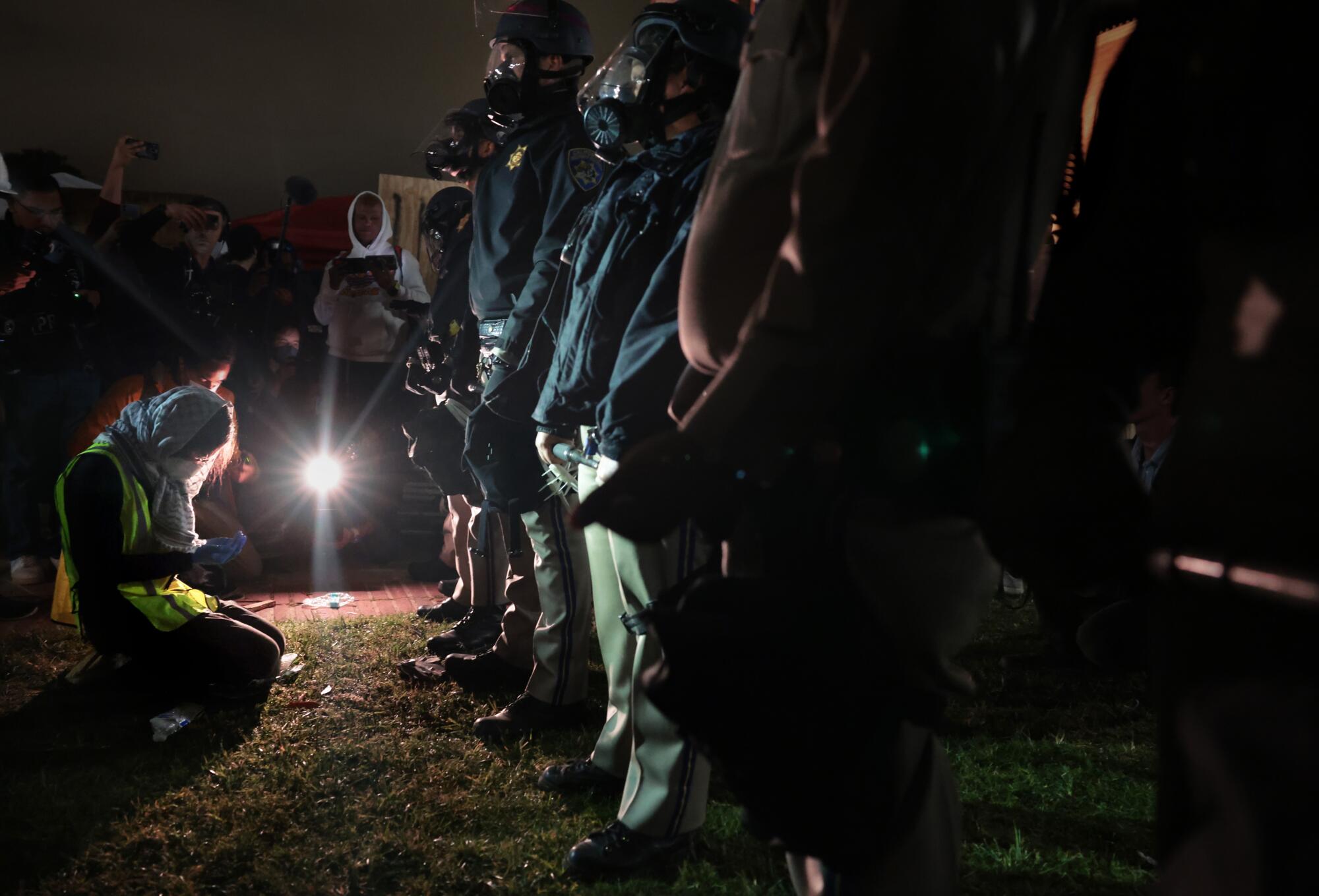
Dan Gold, executive director of Hillel at UCLA, supported the university’s action, saying Jewish students have been bullied, harassed and intimidated around the encampment — including at least 10 who said they were denied access to nearby walkways after encampment monitors asked them if they were Zionists. A Star of David with the words “step here” was drawn in the area, he said.
“This encampment violates a long list of university policies, and the result of not enforcing these rules that every other student and student group follows to a T is chaos and unrest — and worse, it allows for even more intense forms of hate to persist and grow,” Gold said.
Block said the campus was aiming to keep all sides safe by “significantly” increasing the security presence with more law enforcement officers, safety personnel and student affairs staff. Law enforcement is investigating recent acts of violence, and barriers that demonstrators used to block access to buildings have been removed, Block said. Students involved could face suspension or expulsion.
UCLA added that it “encouraged” students to use established university procedures to find appropriate locations to gather and protest.
Times staff writers Richard Winton, Melissa Gomez, Dakota Smith, Colleen Shalby and photographer Michael Blackshire contributed to this report.
More to Read
Sign up for Essential California
The most important California stories and recommendations in your inbox every morning.
You may occasionally receive promotional content from the Los Angeles Times.


